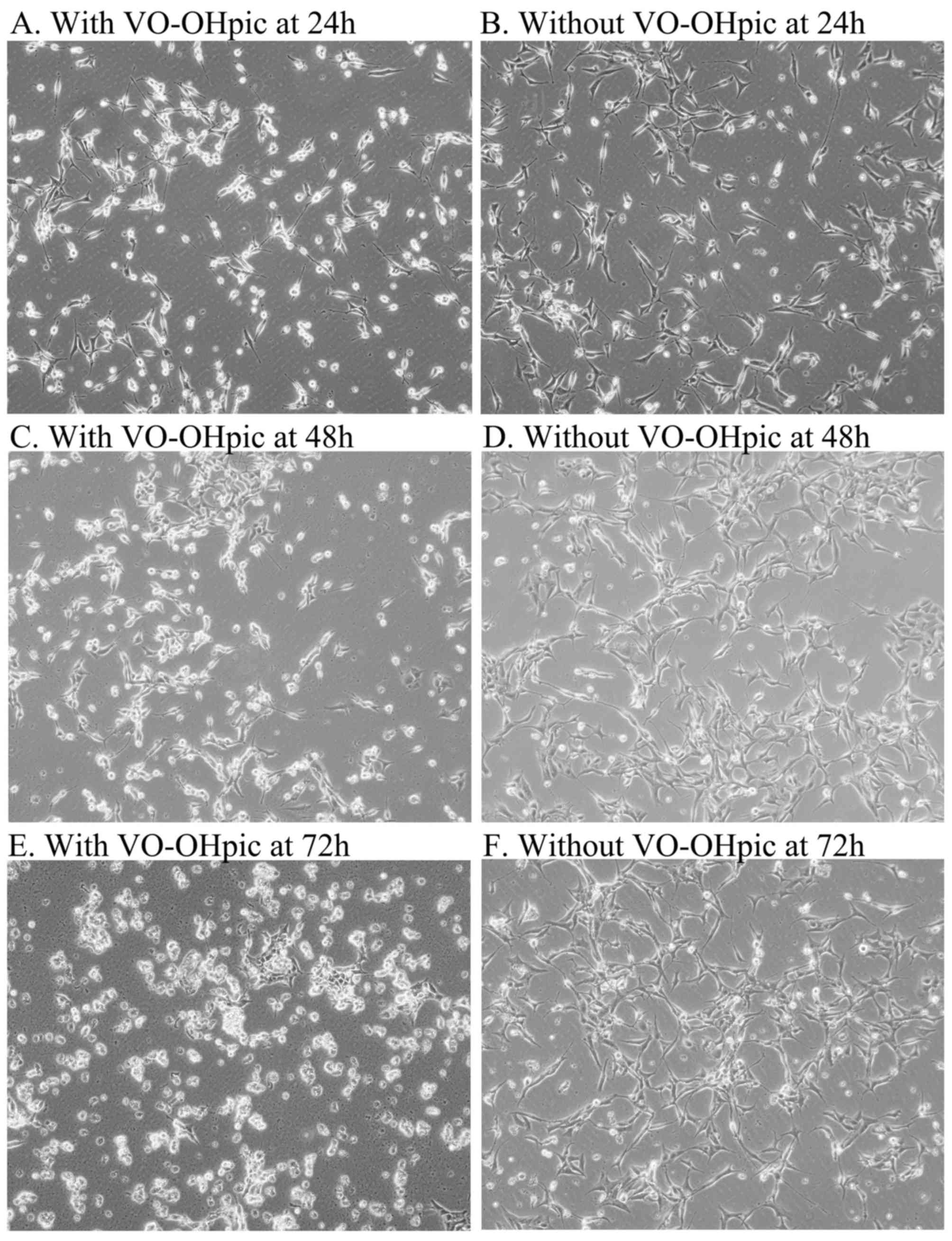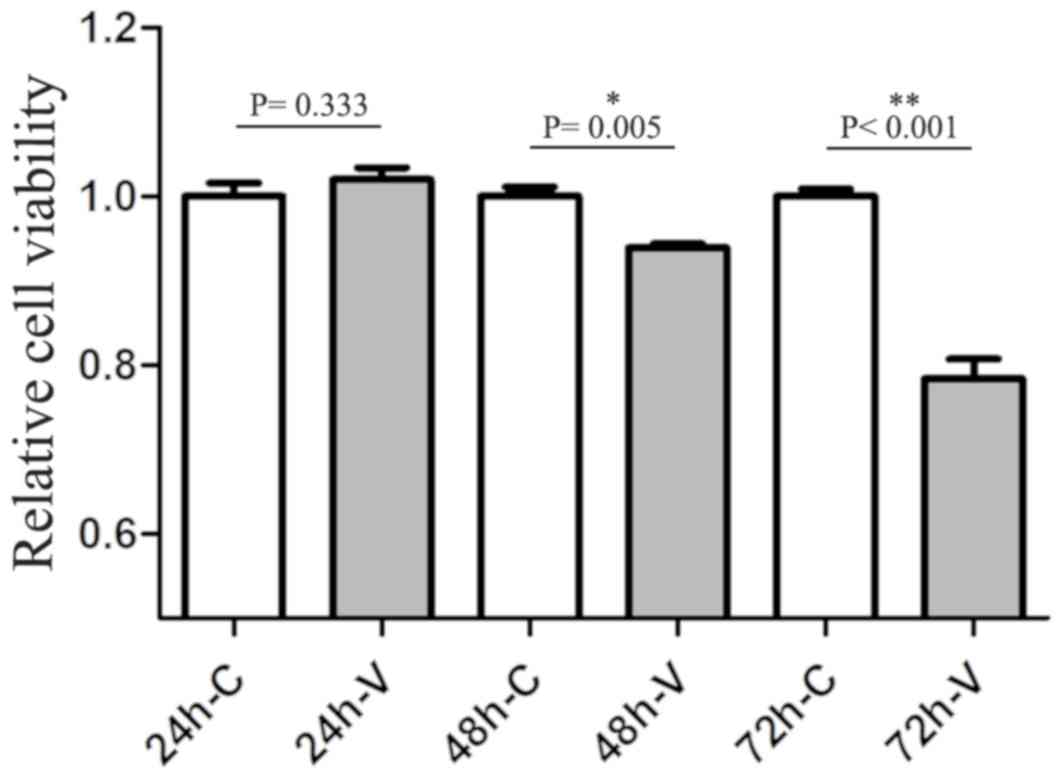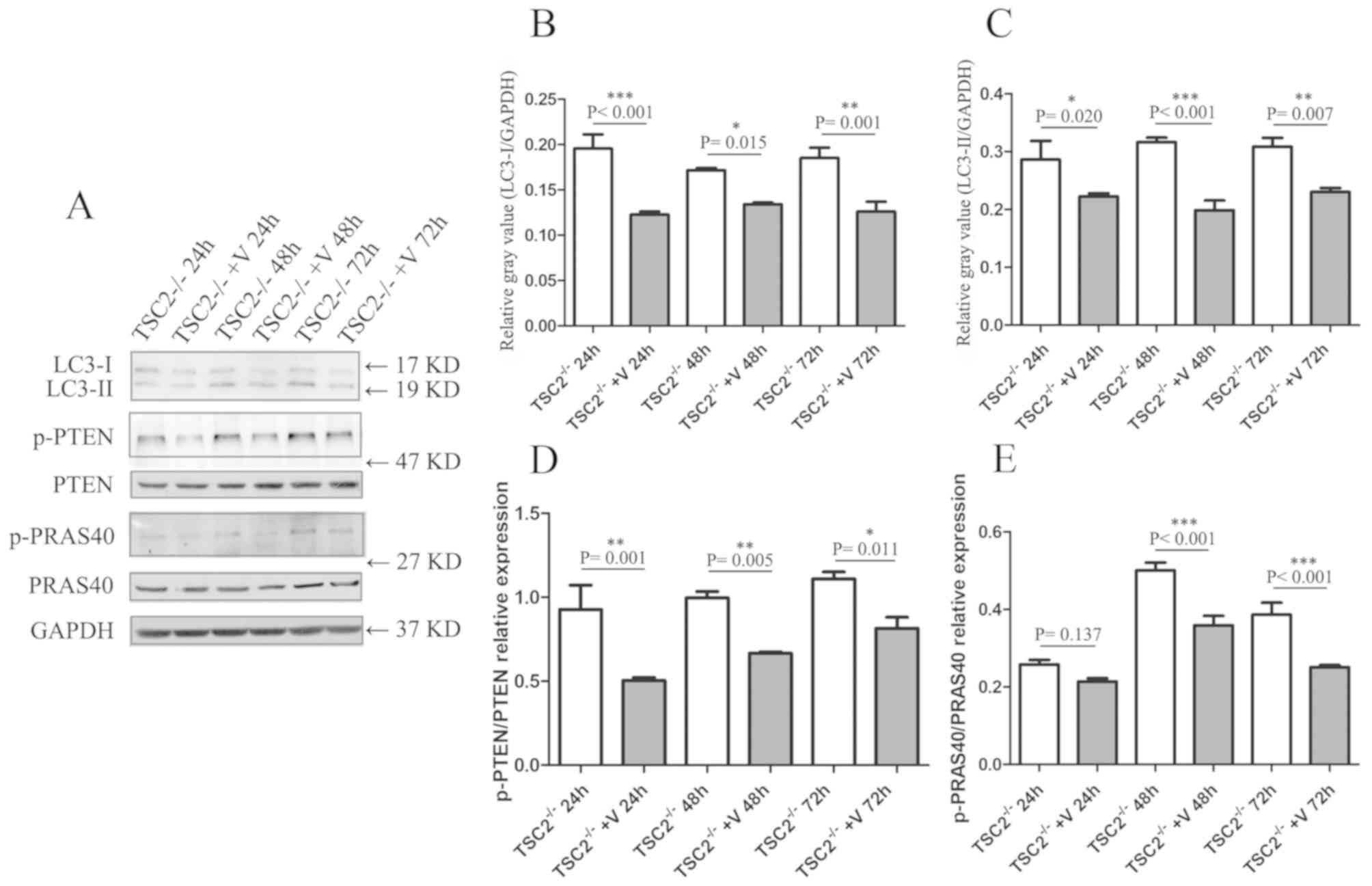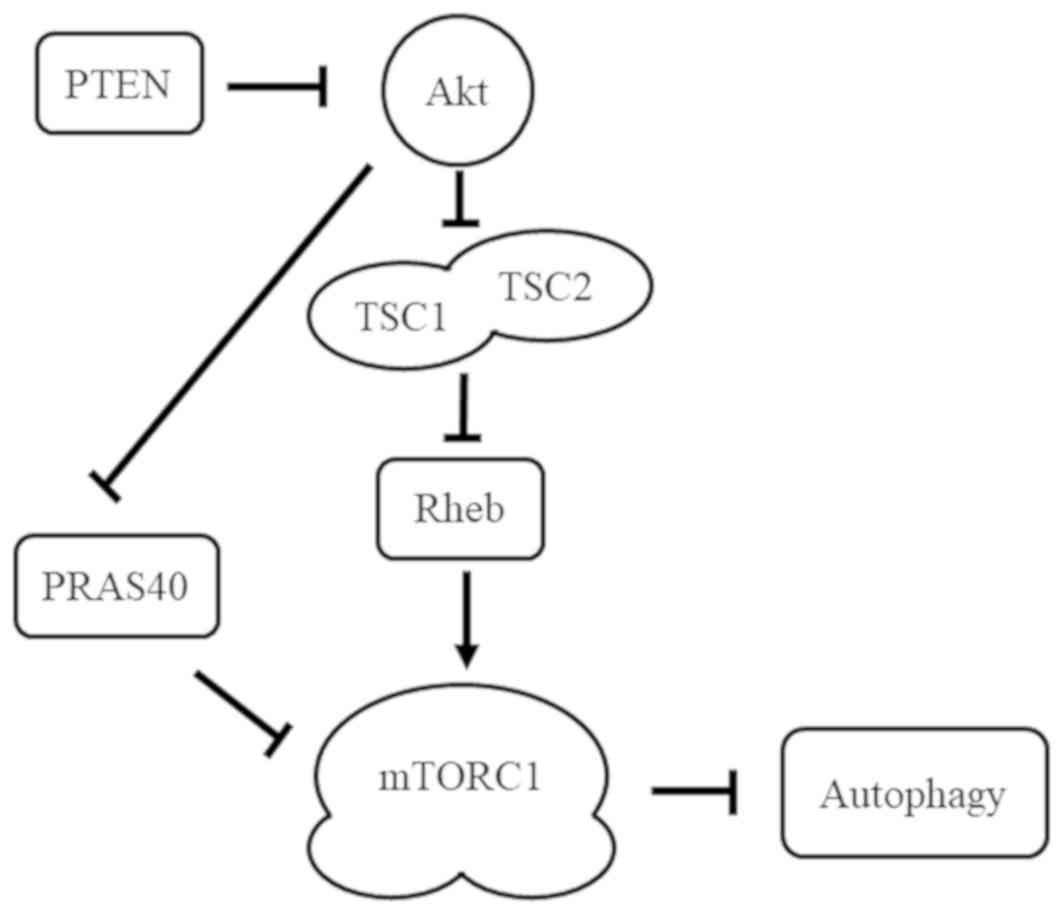|
1
|
Sasongko TH, Ismail NF and Zabidi-Hussin
Z: Rapamycin and rapalogs for tuberous sclerosis complex. Cochrane
Database Syst Rev. 7(CD011272)2016.PubMed/NCBI View Article : Google Scholar
|
|
2
|
Lam HC, Siroky BJ and Henske EP: Renal
disease in tuberous sclerosis complex: Pathogenesis and therapy.
Nat Rev Nephrol. 14:704–716. 2018.PubMed/NCBI View Article : Google Scholar
|
|
3
|
Vekeman F, Magestro M, Karner P, Duh MS,
Nichols T, van Waalwijk van Doorn-Khosrovani SB and Zonnenberg BA:
Kidney involvement in tuberous sclerosis complex: The impact on
healthcare resource use and costs. J Med Econ. 18:1060–1070.
2015.PubMed/NCBI View Article : Google Scholar
|
|
4
|
Bissler JJ, Kingswood JC, Radzikowska E,
Zonnenberg BA, Frost M, Belousova E, Sauter M, Nonomura N,
Brakemeier S, de Vries PJ, et al: Everolimus for renal
angiomyolipoma in patients with tuberous sclerosis complex or
sporadic lymphangioleiomyomatosis: Extension of a randomized
controlled trial. Nephrol Dial Transplant. 31:111–119.
2016.PubMed/NCBI View Article : Google Scholar
|
|
5
|
Cai Y, Guo H, Wang W, Li H, Sun H, Shi B
and Zhang Y: Assessing the outcomes of everolimus on renal
angiomyolipoma associated with tuberous sclerosis complex in China:
A two years trial. Orphanet J Rare Dis. 13(43)2018.PubMed/NCBI View Article : Google Scholar
|
|
6
|
Parkhitko A, Myachina F, Morrison TA,
Hindi KM, Auricchio N, Karbowniczek M, Wu JJ, Finkel T, Kwiatkowski
DJ, Yu JJ and Henske EP: Tumorigenesis in tuberous sclerosis
complex is autophagy and p62/sequestosome 1 (SQSTM1)-dependent.
Proc Natl Acad Sci USA. 108:12455–12460. 2011.PubMed/NCBI View Article : Google Scholar
|
|
7
|
Parzych KR and Klionsky DJ: An overview of
autophagy: Morphology, mechanism, and regulation. Antioxid Redox
Signal. 20:460–473. 2014.PubMed/NCBI View Article : Google Scholar
|
|
8
|
Wang CW and Klionsky DJ: The molecular
mechanism of autophagy. Mol Med. 9:65–76. 2003.PubMed/NCBI
|
|
9
|
Miyahara H, Natsumeda M, Shiga A, Aoki H,
Toyoshima Y, Zheng Y, Takeuchi R, Murakami H, Masuda H, Kameyama S,
et al: Suppressed expression of autophagosomal protein LC3 in
cortical tubers of tuberous sclerosis complex. Brain Pathol.
23:254–262. 2013.PubMed/NCBI View Article : Google Scholar
|
|
10
|
Wirawan E, Vanden Berghe T, Lippens S,
Agostinis P and Vandenabeele P: Autophagy: For better or for worse.
Cell Res. 22:43–61. 2012.PubMed/NCBI View Article : Google Scholar
|
|
11
|
Amaravadi RK, Yu D, Lum JJ, Bui T,
Christophorou MA, Evan GI, Thomas-Tikhonenko A and Thompson CB:
Autophagy inhibition enhances therapy-induced apoptosis in a
Myc-induced model of lymphoma. J Clin Invest. 117:326–336.
2007.PubMed/NCBI View
Article : Google Scholar
|
|
12
|
Levine B and Kroemer G: Autophagy in the
pathogenesis of disease. Cell. 132:27–42. 2008.PubMed/NCBI View Article : Google Scholar
|
|
13
|
Kim YC and Guan KL: mTOR: A pharmacologic
target for autophagy regulation. J Clin Invest. 125:25–32.
2015.PubMed/NCBI View
Article : Google Scholar
|
|
14
|
Pulido R: PTEN inhibition in human disease
therapy. Molecules. 23(E285)2018.PubMed/NCBI View Article : Google Scholar
|
|
15
|
Nardella C, Chen Z, Salmena L, Carracedo
A, Alimonti A, Egia A, Carver B, Gerald W, Cordon-Cardo C and
Pandolfi PP: Aberrant Rheb-mediated mTORC1 activation and Pten
haploinsufficiency are cooperative oncogenic events. Genes Dev.
22:2172–2177. 2008.PubMed/NCBI View Article : Google Scholar
|
|
16
|
Zhang H, Bajraszewski N, Wu E, Wang H,
Moseman AP, Dabora SL, Griffin JD and Kwiatkowski DJ: PDGFRs are
critical for PI3K/Akt activation and negatively regulated by mTOR.
J Clin Invest. 117:730–738. 2007.PubMed/NCBI View
Article : Google Scholar
|
|
17
|
Spinelli L, Lindsay YE and Leslie NR: PTEN
inhibitors: An evaluation of current compounds. Adv Biol Regul.
57:102–111. 2015.PubMed/NCBI View Article : Google Scholar
|
|
18
|
Saran U, Foti M and Dufour JF: Cellular
and molecular effects of the mTOR inhibitor everolimus. Clin Sci
(Lond). 129:895–914. 2015.PubMed/NCBI View Article : Google Scholar
|
|
19
|
Yun YS, Kim KH, Tschida B, Sachs Z,
Noble-Orcutt KE, Moriarity BS, Ai T, Ding R, Williams J, Chen L, et
al: mTORC1 coordinates protein synthesis and immunoproteasome
formation via PRAS40 to prevent accumulation of protein stress. Mol
Cell. 61:625–639. 2016.PubMed/NCBI View Article : Google Scholar
|
|
20
|
Kenerson HL, Aicher LD, True LD and Yeung
RS: Activated mammalian target of rapamycin pathway in the
pathogenesis of tuberous sclerosis complex renal tumors. Cancer
Res. 62:5645–5650. 2002.PubMed/NCBI
|
|
21
|
Kenerson H, Dundon TA and Yeung RS:
Effects of rapamycin in the Eker rat model of tuberous sclerosis
complex. Pediatr Res. 57:67–75. 2005.PubMed/NCBI View Article : Google Scholar
|
|
22
|
Bissler JJ, Kingswood JC, Radzikowska E,
Zonnenberg BA, Frost M, Belousova E, Sauter M, Nonomura N,
Brakemeier S, de Vries PJ, et al: Everolimus for angiomyolipoma
associated with tuberous sclerosis complex or sporadic
lymphangioleiomyomatosis (EXIST-2): A multicentre, randomised,
double-blind, placebo-controlled trial. Lancet. 381:817–824.
2013.PubMed/NCBI View Article : Google Scholar
|
|
23
|
Franz DN, Belousova E, Sparagana S, Bebin
EM, Frost M, Kuperman R, Witt O, Kohrman MH, Flamini JR, Wu JY, et
al: Efficacy and safety of everolimus for subependymal giant cell
astrocytomas associated with tuberous sclerosis complex (EXIST-1):
A multicentre, randomised, placebo-controlled phase 3 trial.
Lancet. 381:125–132. 2013.PubMed/NCBI View Article : Google Scholar
|
|
24
|
Bissler JJ, McCormack FX, Young LR, Elwing
JM, Chuck G, Leonard JM, Schmithorst VJ, Laor T, Brody AS, Bean J,
et al: Sirolimus for angiomyolipoma in tuberous sclerosis complex
or lymphangioleiomyomatosis. N Engl J Med. 358:140–151.
2008.PubMed/NCBI View Article : Google Scholar
|
|
25
|
Xiong X, Xie R, Zhang H, Gu L, Xie W,
Cheng M, Jian Z, Kovacina K and Zhao H: PRAS40 plays a pivotal role
in protecting against stroke by linking the Akt and mTOR pathways.
Neurobiol Dis. 66:43–52. 2014.PubMed/NCBI View Article : Google Scholar
|
|
26
|
Chong ZZ: Targeting PRAS40 for multiple
diseases. Drug Discov Today. 21:1222–1231. 2016.PubMed/NCBI View Article : Google Scholar
|



















